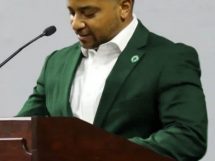By John David Dyche
U. S. Sen. Rand Paul has the most realistic prospect of being elected president of any Kentuckian since Henry Clay or John C. Breckinridge. Others since have had hopes, but Paul actually has a chance.
Paul just won the presidential straw poll at the Conservative Political Action Conference for the second consecutive year. His speech was a libertarian manifesto focused largely on personal privacy issues that appeal to younger voters.
Other polls of 2016 Republican presidential prospects put Paul near the top of a tightly bunched pack. He clearly still has work to do in expanding his support among the party’s broader mainstream nominating base.
Paul realizes this, as his reflected by his recent emphasis on foreign policy and national security. He bristles when rivals refer to his views as isolationist, but other Republicans regularly attack Paul on defense and international affairs.
2008 Republican presidential nominee John McCain called Paul a “wacko bird” in connection with the Kentuckian’s drone-related filibuster of the nomination of John Brennan to be CIA chief. CPAC straw poll runner-up (by 20 percent) and fellow tea party darling Senator Ted Cruz of Texas took pains to point out that he disagreed with Paul on foreign policy.
Tackling this potential problem area head on, Paul recently penned a piece for TIME entitled “U.S. Must Take Strong Action Against Putin’s Aggression.” In it, he supports a number of non-military options for punishing Russia’s leader for seizing Crimea from Ukraine.
Paul’s proposals do not go much beyond what the Obama administration is advocating or doing, however. That did not stop him from concluding his essay with this rousing declaration: “But let me be clear: If I were president, I wouldn’t let Vladimir Putin get away with it.”
On the “Fox News Sunday” show the day after the CPAC straw poll Paul again referred to how thing would be if he was in the White House. Citing former Republican President Ronald Reagan’s maxim to not mistake reluctance for war for a lack of resolve, Paul said, “People still need to know this. Were I in charge I think they would.”
Invoking another Republican icon, former war general and President Dwight Eisenhower, Paul opined that “the U.S. can actually be stronger by doing less.” He also expressed the view that “the greatest threat to America’s security is our national debt.”
Paul also claimed the mantle of Reagan and Eisenhower foreign policy in a similar article for Breitbart.com. “What America needs today is a commander-in-chief who will defend the country and project strength, but who is also not eager for war,” he said.
In a shot at some other Republicans Paul added, “What we don’t need right now is politicians who have never seen war talking tough for the sake of their political careers.” He continued, “There is a time for military action, such as after 9/11. There is a time for diplomacy and the strategic use of soft power, such as now with Russia.”
Events over the next two years will put Paul’s highly nuanced national security views to the test. He must walk a tightrope between the neo-isolationist pacifism natural to his libertarian heritage and the robust neo-conservatism that is more natural to the Republican rank and file.
A successful terrorist attack could call Paul’s opposition to “government spying” into question. Further aggression by Russia or another rising international power like China or Iran could challenge his palpable reluctance to use military force.
Paul faces plenty of other hurdles, too. There is his penchant for controversy and gaffes (e.g., his comments on the Civil Rights Act of 1964; his “Southern Avenger” staffer; the charge that he plagiarized a speech).
And there is the continuing conundrum of whether Paul can be on the ballot for both the Senate and the presidency in 2016. Legislative resolution of that issue appears unlikely given Kentucky Democratic Speaker of the House Greg Stumbo’s recent non sequitur, “If he can’t make up his mind on that, how can he care for the people’s business?”
Paul’s post-straw poll statement echoed his speech themes with which he is most comfortable. “The fight for liberty continues, and we must continue to stand up and say: We’re free and no one, no matter how well-intentioned, will take our freedoms from us. Together we will stand up for the Constitution. Together we will fight for what is right. Thank you, and onwards to victory.”
It was not clear what particular “victory” Paul was talking about, but events have a way of shaping campaigns. Paul is adroitly pivoting from personal freedom to national security concerns, and his deftness in doing so demonstrates why he is the first Kentuckian in well over a century to have a real shot at winning the presidency.
John David Dyche is a Louisville attorney and a political commentator for WDRB.com. His e-mail is [email protected]. Follow him on Twitter @jddyche.




















Add Comment